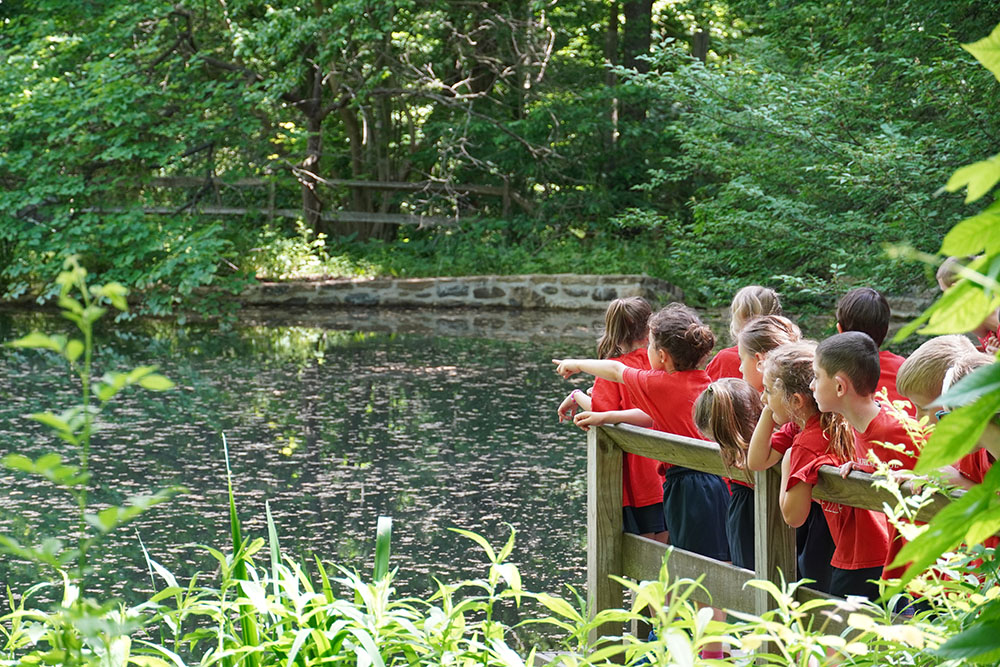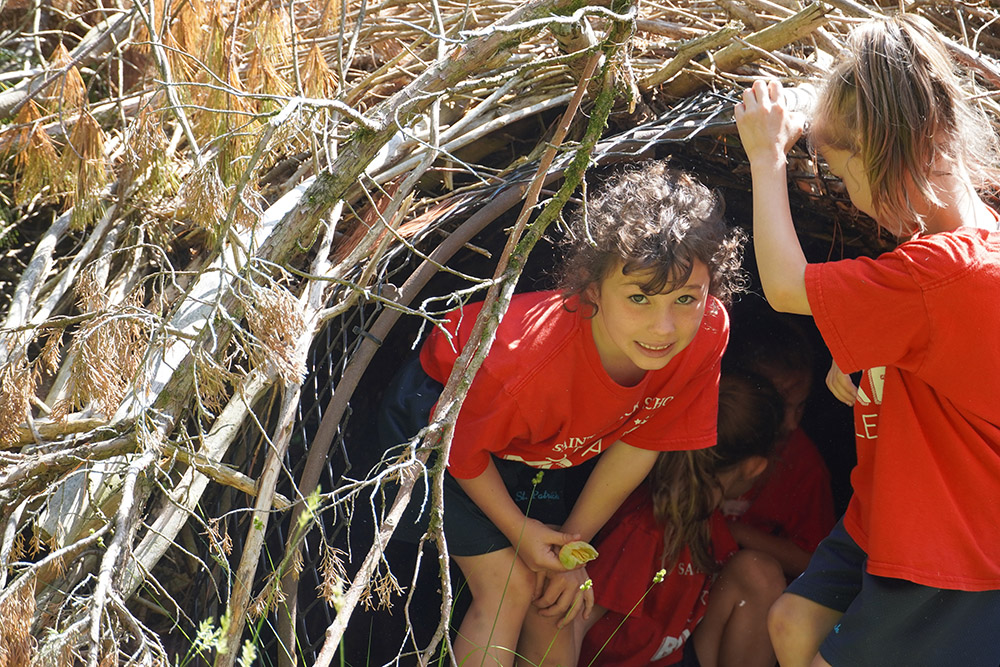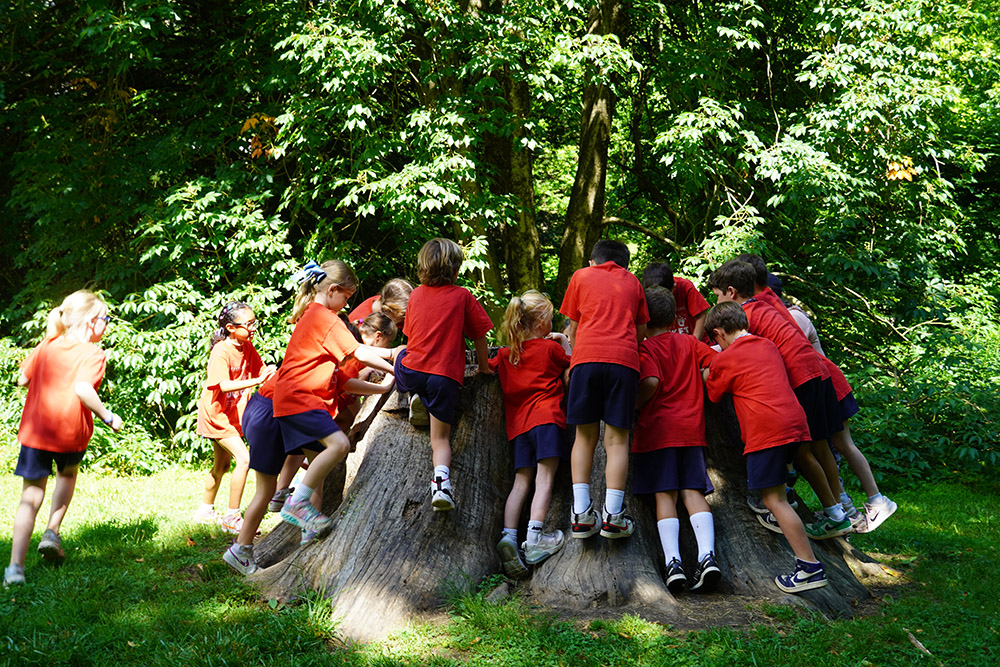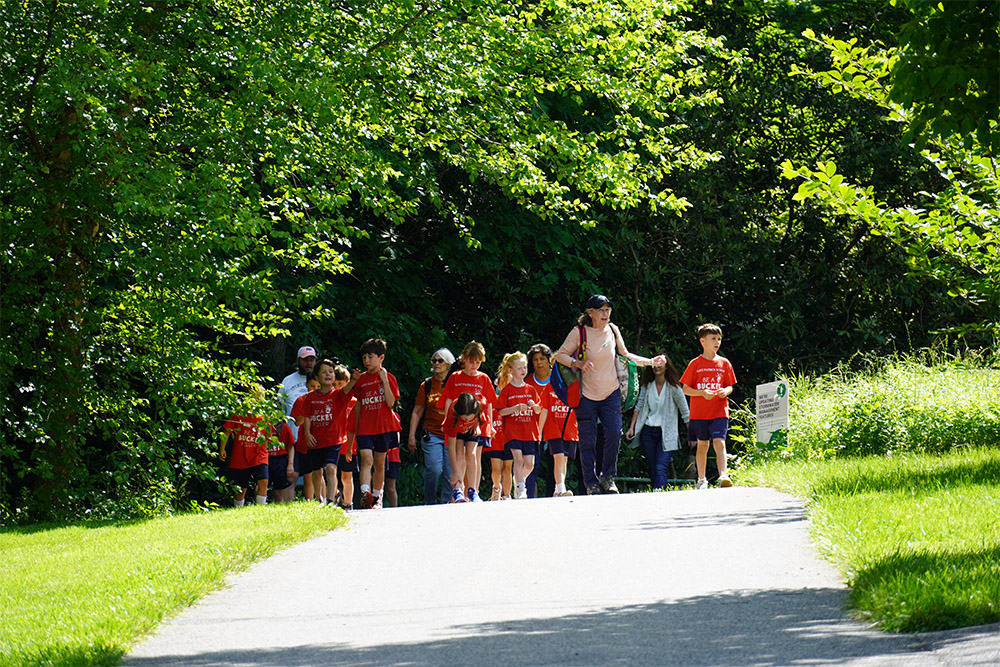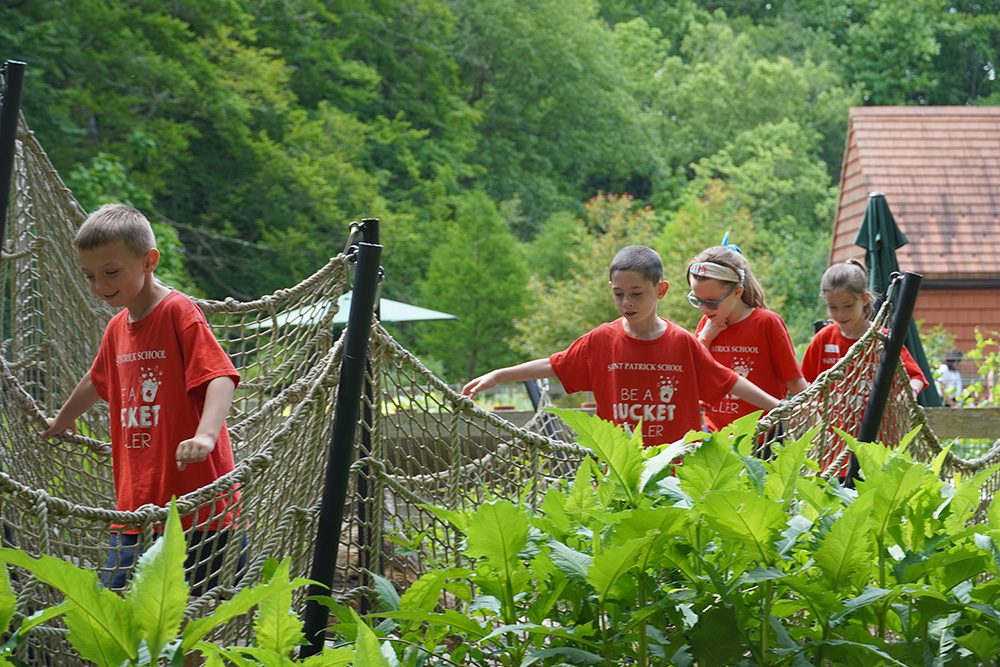CASEY FELDMAN FOUNDATION FUNDS TYLER FIELD TRIP PROGRAM
Casey Feldman Foundation Gift Enables Elementary Students to Experience Nature in a Unique Way at Tyler Arboretum
By Chris Mondics
A gaggle of first graders clad in red school tee shirts races down a garden path toward a pond, as a handful of adults struggle to keep up.
The kids get to the edge of the pond and that is when the excitement starts.
“Tadpoles. I see tadpoles. There’s a big one right straight down from my finger. Two of them, three of them. See?” shouts one child with glee.
“I see one,” said another.
“Oh, there’s a fish, right there,” cries a third.
If only such enthusiasm could be bottled and shared with the larger world, perhaps purchased online.
Tyler Arboretum Field Trip Shows Children the Connection Between Their Lives and The Environment
Retired teacher and tour leader Vicki Pecunia does her best to direct the seemingly seismic energy, unleashed in part because the children, rather than spending the day sitting at a school desk, instead are frolicking outdoors under sunny skies. Before the happy children get to the pond, Pecunia tells them what to expect.
“We’re hoping to see some wildlife,” she tells the children. “Our best chance to see some wildlife is if it’s very quiet when we cross the bridge, because that is where the snakes are. We might also see turtles, snapping turtles, fish, all kinds of cool stuff.”
For Pecunia, a volunteer, and the staff at the Tyler Arboretum, it was all in a day’s work. The Arboretum, a vast expanse of specimen plantings, fields and natural habitat near Media, Pa. in the Philadelphia suburbs, offers field trips for young school children as a way to introduce them to the intricacies of the natural world. The goal is to show how people are intimately linked to and dependent on plant and animal life for our own wellbeing.
Casey Feldman Foundation Provides Support for Youth Programs
The field trip program is sponsored in part by the Casey Feldman Foundation, founded by Joel Feldman and Dianne Anderson in honor of their daughter, Casey Feldman, who was run over in a crosswalk at the age of 21 by a distracted driver. In addition to educating the public about distracted driving, the Foundation supports a number of programs for students from grades K-12.
Joel Feldman said Tyler’s field trip program is a perfect fit for a foundation grant because of Casey’s love of nature and her interest in expanding opportunities for children of all backgrounds. Many of the participants in the Tyler field trips come from urban school districts where children have little access to the outdoors.
So a visit to Tyler can be something of a revelation.
“Casey was a big nature lover,” Feldman said. “From a very early age, she was out there chasing butterflies and collecting bugs. This (the Tyler program) is all about giving children the opportunity to experience nature in a unique way that can change the way they view the natural world that surrounds them.”
The idea of the field trip program, according to Chris Lauf, director of education at Tyler, is to show children the links between their lives and the larger environment and all of its inputs. Environmental stewardship means making choices and sometimes having to change behavior. It’s easier to make that case if young people come to feel that they have a stake in the outcome, that protecting something they love is worth the effort.
What better way than to get them to fall in love with the arboretum.
More than a generation ago, recycling was seen as an oddity and an inconvenience by some. But as landfills filled to the overflowing, and politicians fought with homeowners over plans to expand garbage dumps or to build incinerators, people more and more came to see value in generating less trash.
How much simpler it was to throw out less than to fight over where to put it.
“If folks can understand that their behavior and the behavior of their community impacts a place that they love, they are much more likely to change their behavior,” Lauf said.
The big value add at Tyler is the vastness of its carefully curated space. The arboretum comprises more than 100 acres of terrain, enclosed within a deer fence, with plant collections and settings like the pond where the children got to see the turtles, tadpoles and fish in their natural habitat. There are also educational gardens such as a pollinator preserve where visitors explore the complex interplay between flowering plants and insects that pollinate them.
Tyler Arboretum History Dates Back to 1825
Outside the deer fence is another 550 acres of forests, hiking trails and historic farm buildings. The property had been in the hands of eight generations of one family, from 1681 when English Quaker Thomas Minshall purchased it from William Penn, through 1944 when descendant Laura Tyler left the property in trust as the John J. Tyler Arboretum, named for her late husband.
Two brothers, Jacob and Minshall Painter, started the arboretum in 1825 when they set aside a portion of the property for the systematic planting and cultivation of more than 1,000 varieties of trees and shrubs. They also built a library to house their growing natural sciences collection and equipment.
Tyler sees educational outreach as a critical part of its mission, and the arboretum had been offering school field trips as far back as the 1990s. But the trips were suspended during the Covid epidemic, and the program had only restarted this year.
Lauf is a transplanted Australian and had been director of educational programming at the Franklin Institute before joining Tyler. He is an avid backpacker and has graduate training in science communications.
About 1300 Children Participated in Tyler Arboretum’s Field Trips During the 2023-24 School Year
Lauf said that he expects that some 1,300 children will have gone on field trips at Tyler by the time this season’s program ends with the school year. He anticipates that as many as 2,000 children will visit the arboretum during the next school year.
For Lauf, it’s all about getting the children to connect with nature – and to be inspired by it. The children are unfailingly charmed by the place.
“That is what we hear at the end of every field trip,” Lauf said. “We hear the kids talk about the sights, the sounds and the smells of the bark, or the cold water. You can really tell that these kids have had a multi-sensory experience that completely captures their imagination.”
